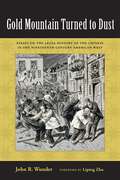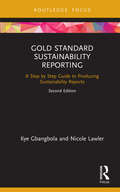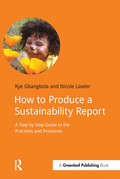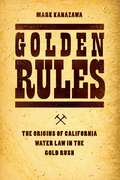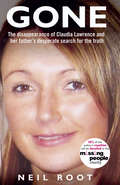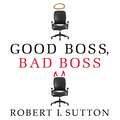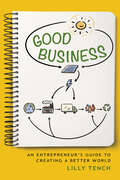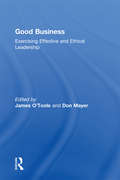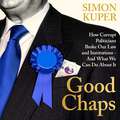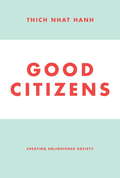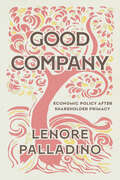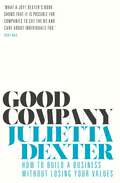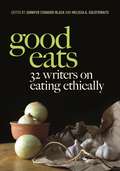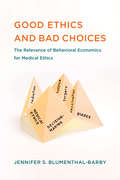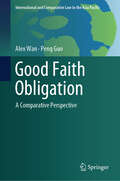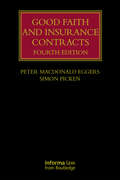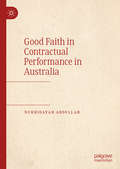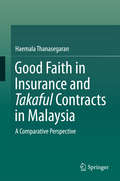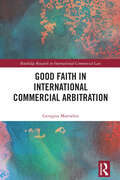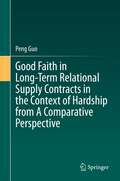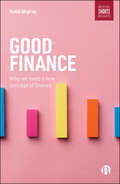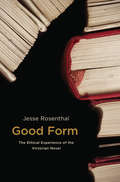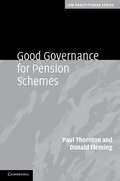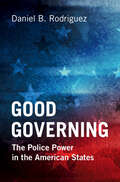- Table View
- List View
Gold Mountain Turned to Dust: Essays on the Legal History of the Chinese in the Nineteenth-Century American West
by John R. WunderSome half million Chinese immigrants settled in the American West in the nineteenth century. In spite of their vital contributions to the economy in gold mining, railroad construction, the founding of small businesses, and land reclamation, the Chinese were targets of systematic political discrimination and widespread violence. This legal history of the Chinese experience in the American West, based on the author&’s lifetime of research in legal sources all over the West—from California to Montana to New Mexico—serves as a basic account of the legal treatment of Chinese immigrants in the West.The first two essays deal with anti-Chinese racial violence and judicial discrimination. The remainder of the book examines legal precedents and judicial doctrines derived from Chinese cases in specific western states. The Chinese, Wunder shows, used the American legal system to protect their rights and test a variety of legal doctrines, making vital contributions to the legal history of the American West.
Gold Standard Sustainability Reporting: A Step by Step Guide to Producing Sustainability Reports
by Kye Gbangbola Nicole LawlerThis highly practical and concise book shows you how to undertake a reporting process and produce a sustainability report in line with the new standards and frameworks presented by the International Integrated Reporting Council (IIRC) and the Global Reporting Initiative (GRI). Fully updated to ensure compliance with the new standards, this second edition shows how to actually produce a sustainability report as well as the key processes in the planning: how to produce a business case; the development of actions plans; process and team leadership; and generating cross-functional buy-in. Templates are provided for certain steps in order to simplify the tasks involved at each point in the process. Anyone involved in delivering or developing a process to embed sustainability reporting for an organisation will find this book invaluable, for example, chief sustainability officers, chief financial officers and company secretaries. It will also be of interest to students in the field of sustainability.
Gold Standard Sustainability Reporting: A Step by Step Guide to Producing Sustainability Reports
by Kye Gbangbola Nicole LawlerThis how-to book provides a step-by-step guide to the constituent practices and processes needed to produce a sustainability report, structured around the Global Reporting Initiative’s Sustainability Reporting Process. It is written by the first GRI Certified training providers in the UK, who also produced the first GRI Certified Training course to be accredited by the Institute of Environmental Management & Assessment (IEMA). This book will show you: (1) how to produce a business case, develop action plans, secure leadership over process and people, and how to generate cross functional buy in, (2) how to do stakeholder engagement, materiality and assurance, and how to collect quality data and (3) how to plan and prepare to report, how to finalize and disseminate a report, and how to apply and manage the GRI Materiality Matters Check. The authors also provide invaluable tips on how to write a report, and how to position it on media platforms for both dissemination and feedback.In short, this book is a masterclass on precisely the things that individuals and organizations need and want to know to set up or improve the quality of their reporting processes, and to write effective reports.# This book will also enable stakeholders with a professional, personal or academic interest in reporting to learn how to evaluate a report – an essential skill for report writers too.
Golden Rules: The Origins of California Water Law in the Gold Rush
by Mark KanazawaFresh water has become scarce and will become even more so in the coming years, as continued population growth places ever greater demands on the supply of fresh water. At the same time, options for increasing that supply look to be ever more limited. No longer can we rely on technological solutions to meet growing demand. What we need is better management of the available water supply to ensure it goes further toward meeting basic human needs. But better management requires that we both understand the history underlying our current water regulation regime and think seriously about what changes to the law could be beneficial. For Golden Rules, Mark Kanazawa draws on previously untapped historical sources to trace the emergence of the current framework for resolving water-rights issues to California in the 1850s, when Gold Rush miners flooded the newly formed state. The need to circumscribe water use on private property in support of broader societal objectives brought to light a number of fundamental issues about how water rights ought to be defined and enforced through a system of laws. Many of these issues reverberate in today’s contentious debates about the relative merits of government and market regulation. By understanding how these laws developed across California’s mining camps and common-law courts, we can also gain a better sense of the challenges associated with adopting new property-rights regimes in the twenty-first century.
Gone in the Night: The Dowaliby Family's Encounter with Murder and the Law
by Rob Warden David PortessA true story of prosecutorial and judicial misconduct
Gone: The Disappearance of Claudia Lawrence and Her Father's Desperate Search for the Truth
by Neil RootThe last time that anyone heard from 35-year-old Claudia Lawrence, a chef at the University of York, was when she sent a text message to a friend on 18 March 2009 at 8.23 p.m. She has never been heard from or seen again, and her disappearance is a mystery that endures to this day.What happened to Claudia that early spring evening – or was it early the following morning on her way to work? There had been nothing abnormal about her behaviour before she vanished, and there were no signs of a struggle at her home. A Crimewatch reconstruction has been broadcast, and the police investigation into the case has cost more than £750,000. Dozens of interviews have thrown up numerous leads, but there are no concrete clues.With extensive access to her family and friends, in Gone, Neil Root assesses the facts and theories and asks: where is Claudia?
Good Boss, Bad Boss: How to Be the Best... and Learn from the Worst
by Robert SuttonFrom the New York Times bestselling author of The No Asshole Rule'I am frequently asked, "Tom, my brother/sister/friend is taking on a new leadership role. What should they read?" I always respond the same way, by recommending one and only one book: Bob Sutton's Good Boss, Bad Boss' - Tom Peters, New York Times bestselling author of In Search of Excellence.Good Boss, Bad Boss was inspired by the thousands of emails, calls and conversations that Robert Sutton received after publishing his bestseller The No Asshole Rule - he found that most of the stories and cries for help he received revolved around one central figure in every workplace: THE BOSS.Sutton's subsequent research showed that the success of every boss depended heavily on how well (or badly) they managed those they worked with and in Good Boss, Bad Boss he demonstrates this by weaving together the best psychological and management secrets with true stories, to reveal the mindset and moves of the best bosses, and contrasts them with the behaviour of the worst.If you want to understand how the best bosses think and act so that you can get better at your job or find a better boss to work for, Good Boss, Bad Boss has all the answers.
Good Business: An Entrepreneur's Guide to Creating a Better World
by Lilly TenchGood Business: An Entrepreneur's Guide to Creating a Better World is an illustrated guide that takes readers through the complicated but exhilarating landscape of social enterprise businesses that are changing the world.A social enterprise is a different kind of business, one that uses a market-driven approach to address a social or environmental problem such as poverty, environmental damage, or resource scarcity, with the dual goals of helping humanity and building a profitable business.With a climate crisis, a growing population, and diminishing natural resources, the need for socially-minded innovators is greater than ever. Good Business is designed to be a practical guide and tool for innovators, entrepreneurs, and dreamers who are attempting to navigate the complicated business models required for social enterprises.
Good Business: Exercising Effective and Ethical Leadership
by Don Mayer James O'TooleThis illuminating and practical collection of essays addresses the increasingly important topics of corporate ethics, social responsibility, and sustainability in the context of effective global business strategies. Instead of condemning business, or exhorting corporate leaders to "do good," the authors deal with the "hot button" issues of our time in a cool and rational manner, seeing them as opportunities rather than as problems. As the authors illustrate, there is no necessary trade-off between business leaders doing the right thing, on one hand, and the profitable thing, on the other. They demonstrate that ethics is not peripheral, or in addition to, the central concerns of business. To the contrary, ethics and good citizenship are at the heart of all good business strategies, decisions, and organizational cultures. These essays offer useful examples of how executives can create strategies and cultures that are, both and at the same time, ethical and effective--the essence of GOOD BUSINESS. A PUBLICATION OF THE INSTITUTE FOR ENTERPRISE ETHICS Daniels College of Business, University of Denver
Good Chaps: How Corrupt Politicians Broke Our Law and Institutions - And What We Can Do About It
by Simon KuperThe 'Good Chaps' theory holds that those who rise to power in the UK can be trusted to follow the rules and do the right thing. They're good chaps, after all. Yet Britain appears to have been taken over by bad chaps, and politics is awash with financial scandals, donors who have practically bought shares in political parties, and a shameless contempt for the rules.Simon Kuper, author of the Sunday Times Top Ten bestseller Chums, exposes how corruption took control of public life, and asks: how can we get politicians to behave like good chaps again?
Good Citizens: Creating Enlightened Society
by Thich Nhat HanhIn Good Citizens, Thich Nhat Hanh lays out the foundation for an international solidarity movement based on a shared sense of compassion, mindful consumption, and right action. Following these principles, he believes, is the path to world peace. <P> The book is based on our increased global interconnectedness and subsequent need for harmonious communication and a shared ethic to make our increasingly globalized world a more peaceful place. The book will be appreciated by people of all faiths and cultural backgrounds.While based on the basic Buddhist teachings of the Four Noble Truths and the Eight-Fold Path, Thich Nhat Hanh boldly leaves Buddhist terms behind as he offers his contribution to the creation of a truly global and nondenominational blueprint to overcoming deep-seated divisions and a vision of a world in harmony and the preservation of the planet. Key topics include the true root causes of discrimination; the exploration of the various forms of violence; economic, social, and sexual violence. He encourages the reader to practice nonviolence in all daily interactions, elaborates on the practice of generosity, and teaches the art of deep listening and loving speech to help reach a compromise and reestablish communication after misunderstandings have escalated into conflicts.Good Citizens also contains a new wording of the Five Mindfulness Trainings (traditionally called "precepts") for lay practitioners, bringing them in line with modern-day needs and realities. In their new form they are concrete and practical guidelines of ethical conduct that can be accepted by all traditions.Good Citizens also includes the complete text of the UN Manifesto 2000, a declaration of transforming violence and creating a culture of peace for the benefit of the children of the world. It was drafted by numerous Peace Nobel Prize recipients and signed by over 100 million people worldwide.Coinciding with a US presidential election year, Good Citizens reaches across all political backgrounds and faith traditions. It shows that dualistic thinking--Republican/Democrat, Christian/Muslim--creates tension and a false sense of separateness. When we realize that we share a common ethic and moral code, we can create a community that can change the world.
Good Company: Economic Policy after Shareholder Primacy
by Lenore PalladinoOn the faulty intellectual origins of shareholder primacy—and how policy can win back what’s been lost. In an era of shareholder primacy, share price is king. Businesses operate with short-term goals to deliver profits to shareholders, enjoying stability (and bonuses) in the process. While the public bemoans the doctrine for its insularity and wealth-consolidating effects, its influence over corporate governance persists. Good Company offers an exacting argument for why shareholder primacy was never the right model to follow for truly understanding how corporations operate. Lenore Palladino shows that corporations draw power from public charters—agreements that allow corporations to enjoy all manner of operational benefits. In return, companies are meant to innovate for the betterment of the societies that support them. However, that debt—increasingly wielded for stock buybacks and shareholder bonuses—is not being repaid. Palladino theorizes a modern corporation that plays its intended role while delivering social and economic good in the process and offers tangible policy solutions to make this a reality. Good Company is both an expert introduction to the political economy of the firm—as it was, as it is, as it can be—and a calibrating examination of how public policy can shape companies, and societies, for the better.
Good Company: How to Build a Business without Losing Your Values
by Julietta Dexter'What a joy! Inspiring and powerful.' -- Ruby WaxIn a highly competitive world, many think business success means being ruthless: maximising short-term return for shareholders, cutting overheads, crushing competition, and expanding at an exponential pace. Nothing says this more than Silicon Valley with its macho mantras like 'Move fast and break things' (Facebook) or 'We're a team not a family' (Netflix). But this model is looking increasingly flawed.What if there were another more compassionate way? Julietta Dexter believes there is. In this powerful and hopeful book, the award-winning CEO of The Communications Store explains how she built one of the world's most respected PR & communications companies without compromising her morals and without screwing over her staff or her clients. Highlighting a new paradigm for business, she explains why profit should be just one consideration among several, and why honesty, reliability and diversity are the best foundations for long-term success.
Good Eats: 32 Writers on Eating Ethically
by Melissa A. Goldthwaite Jennifer Cognard-BlackA collection of insightful and personal essays on the role of food in our livesIn an age of mass factory farming, processed and pre-packaged meals, and unprecedented food waste, how does one eat ethically?Featuring a highly diverse ensemble of award-winning writers, chefs, farmers, activists, educators, and journalists, Good Eats invites readers to think about what it means to eat according to individual and collective values. These essays are not lectures about what you should eat, nor an advertisement for the latest diet. Instead, the contributors tell stories of real people—real bellies, real bodies—including the writers themselves, who seek to understand the experiences, cultures, histories, and systems that have shaped their eating and their ethics.A wide array of themes, topics, and perspectives inform the selections within Good Eats, contributing to an enhanced understanding of how we eat as individuals and in groups. From factory farming and the exploitative labor practices surrounding chocolate production, to Indigenous foodways and home and community gardens, the topics featured in this collection describe the wider context of sustenance and ethical choices. Good Eats will encourage you to become more mindful of what and how you eat—and to consider the larger systems and cultures that shape that eating. These essays turn mundane meals into remarkable symbols of how we live, encouraging each of us to find food that is both sustaining and sustainable. Contributors include Ross Gay, DeLyssa Begay, Lynn Z. Bloom, Michael P. Branch, Nikky Finney, Shirley Geok-lin Lim, Barbara J. King, Aimee Nezhukumatathil, Leah Penniman, Adrienne Su, Ira Sukrungruang, Tina Vasquez, Nicole Walker, Thérèse Nelson, Lisa Knopp, Jane Brox, Maureen Stanton, Taté Walker, and many others.
Good Ethics and Bad Choices: The Relevance of Behavioral Economics for Medical Ethics (Basic Bioethics)
by Jennifer S. Blumenthal-BarbyAn analysis of how findings in behavioral economics challenge fundamental assumptions of medical ethics, integrating the latest research in both fields.Bioethicists have long argued for rational persuasion to help patients with medical decisions. But the findings of behavioral economics—popularized in Thaler and Sunstein&’s Nudge and other books—show that arguments depending on rational thinking are unlikely to be successful and even that the idea of purely rational persuasion may be a fiction. In Good Ethics and Bad Choices, Jennifer Blumenthal-Barby examines how behavioral economics challenges some of the most fundamental tenets of medical ethics. She not only integrates the latest research from both fields but also provides examples of how physicians apply concepts of behavioral economics in practice. Blumenthal-Barby analyzes ethical issues raised by &“nudging&” patient decision making and argues that the practice can improve patient decisions, prevent harm, and perhaps enhance autonomy. She then offers a more detailed ethical analysis of further questions that arise, including whether nudging amounts to manipulation, to what extent and at what point these techniques should be used, when and how their use would be wrong, and whether transparency about their use is required. She provides a snapshot of nudging &“in the weeds,&” reporting on practices she observed in clinical settings including psychiatry, pediatric critical care, and oncology. Warning that there is no &“single, simple account of the ethics of nudging,&” Blumenthal-Barby offers a qualified defense, arguing that a nudge can be justified in part by the extent to which it makes patients better off.
Good Faith Obligation: A Comparative Perspective (International and Comparative Law in the Asia Pacific)
by Peng Guo Alex WanThis book provides a study on the relevance of good faith obligation with a specific focus on Australia and China. Good faith has been hailed as one of the most important unresolved contractual issues in contract law. There have been numerous judicial approaches over the years to articulate a baseline for good faith application; however, the direction taken in dealing with this important issue is generally unsatisfactory, both in producing a coherent understanding of the role and sustaining a uniform application of good faith in contracts. This book concentrates on examining whether the continued relevance of good faith in arm’s length contractual relationships based on the reasonable expectations of the contracting parties can be maintained. To accomplish this, good faith is examined by revisiting the legal approaches from a comparative perspective in understanding whether there is a continuing role for good faith in commercial contracts.
Good Faith and Insurance Contracts (Lloyd's Insurance Law Library)
by Peter MacDonald Eggers Simon PickenGood Faith and Insurance Contracts sets out an exhaustive analysis of the law concerning the duty of utmost good faith, as applied to insurance contracts. Now in its fourth edition, it has been updated to address the arrival of the Insurance Act 2015, as well as any references to new case law. In addition, it synthesises all known judicial decisions by the English Courts concerning good faith in this area. This book is still the only text devoted to a discussion of the duty of utmost good faith applicable to insurance contracts. As good faith is an issue which arises in respect of all insurance contracts, it is a book which will be extremely useful to lawyers involved in insurance as well as insurance practitioners.
Good Faith in Contractual Performance in Australia
by Nurhidayah AbdullahThis book gives a detailed account of the current state of the law concerning good faith in contractual performance in Australia, through an empirical study on its reception and development across the various Australian jurisdictions.In Australia, good faith received wide attention after Priestly J introduced in his obiter comments in Renard Construction (ME) v Minister for Works (1992) 26 NSWLR 234.This book focuses on the attitude of the judges to good faith, the definition of good faith, and the possibility of legislating a good faith obligation in Australian contract law. This book also discusses the issues surrounding its development, its meaning, and acceptance at the international level.The empirical legal research adopted in this book will offer a significant contribution in understanding the concept of good faith in Australia from the empirical perspective.
Good Faith in Insurance and Takaful Contracts in Malaysia
by Haemala ThanasegaranThis book examines good faith in non-marine insurance and takaful (Islamic insurance) contracts in Malaysia, and proposes holistic law reform of the same. The first two-thirds of the book comprise an extensive comparative legal analysis of the issues between Malaysia, Australia and the United Kingdom, with the final third dedicated to a socio-economic analysis of law reform and suggestions for law reform particularly suited to Malaysia. The book evaluates whether the duty of utmost good faith (the cornerstone of insurance and takaful contracts) is effectively regulated and, in turn, observed by insurers (and takaful operators) and insureds alike in Malaysia. The adequacy of the Insurance Act 1996 (Malaysia), the Takaful Act 1984 (Malaysia), the Financial Services Act 2013 (Malaysia) and the Islamic Financial Services Act 2013 (Malaysia) is evaluated, along with the supporting infrastructure and oversight measures introduced by the Malaysian government. In doing so, The book examines the duty of utmost good faith from both a doctrinal and a social science perspective, in order to propose suitable legal reform.
Good Faith in International Commercial Arbitration (Routledge Research in International Commercial Law)
by Georgios MartsekisThis book demystifies the effectiveness of good faith in international commercial arbitration law.In the growing universe of international commercial arbitration, it is more pressing than ever to discuss the role of good faith and challenge residual conservative skepticism regarding its usefulness. The book employs principles, standards and concepts which are normatively ingrained in good faith. These include the principle of pacta sunt servanda, the estoppel doctrine, the transnational standard of cooperation and fair dealing among merchants. It also discusses the pertinence of good faith to corrective justice, proportionality, prohibition of discrimination and unconscionability, international public policy and due process, among other concepts. This granular approach demonstrates how good faith is integrated into the practice of international commercial arbitration. The book sheds light on the technical functions of the principle in parties’ substantive protection, contractual interpretation and arbitral procedure, with an ultimate view to reinforcing the soundness and persuasive value of arbitral decision-making. Throughout, the book establishes a uniform and enforceable conceptualization of good faith in transnational disputes.The book will be of interest to practitioners and researchers in the fields of commercial law, arbitration, transnational disputes and international law.
Good Faith in Long-Term Relational Supply Contracts in the Context of Hardship from A Comparative Perspective
by Peng GuoThis book provides fair and acceptable solutions to hardship issues in long-term relational supply contracts. This book uses an approach to strike a balance between the traditional approach underlying classical contract law which emphasises the almost absolute prevalence of the principle of pacta sunt servanda and a flexible approach that is based on the principle of clausula rebus sic stantibus. This book argues for an emerging principle of pacta sunt servanda bona fide on the basis of the relational contract theory. Additionally, this book demonstrates how good faith can serve as a foundation for imposing a duty to renegotiate on the parties. The aim of this book is rather to propose how relational contract theory can be applied to the analysis of specific legal rules in general. Lastly, this boos highlights how the duty to renegotiate and the power to adapt a contract can be further developed upon the occurrence of hardship, based on good faith and the relational nature and characteristics of a long-term relational supply contract. This book explores and enriches the existing research on relational contract theory concentrates primarily on its application in domestic contract laws, particularly in the regulation of long-term contracts in American contract law. As an outcome this book provides a more feasible and satisfactory approach for courts or arbitral tribunals to undertake when facing hardship issues in international contract disputes. Overall, hardship themes, long-term relational supply contracts and good faith are examined extensively.
Good Finance: Why We Need a New Concept of Finance
by Vedat AkgirayJust as we need good food for good health, so too do we need ‘good finance’ for social and economic wellness. In this book, Vedat Akgiray presents a timely critique of extreme financialisation, of the economics profession’s flawed modelling approach and the continuing blind faith in the efficient market hypothesis. Outlining the causes of financial crises and their socioeconomic effects, Good Finance puts the issues into perspective. It offers a clear platform upon which our current concept of finance can be revised for the good of society.
Good Form: The Ethical Experience of the Victorian Novel
by Jesse RosenthalWhat do we mean when we say that a novel's conclusion "feels right"? How did feeling, form, and the sense of right and wrong get mixed up, during the nineteenth century, in the experience of reading a novel? Good Form argues that Victorian readers associated the feeling of narrative form--of being pulled forward to a satisfying conclusion--with inner moral experience. Reclaiming the work of a generation of Victorian "intuitionist" philosophers who insisted that true morality consisted in being able to feel or intuit the morally good, Jesse Rosenthal shows that when Victorians discussed the moral dimensions of reading novels, they were also subtly discussing the genre's formal properties.For most, Victorian moralizing is one of the period's least attractive and interesting qualities. But Good Form argues that the moral interpretation of novel experience was essential in the development of the novel form--and that this moral approach is still a fundamental, if unrecognized, part of how we understand novels. Bringing together ideas from philosophy, literary history, and narrative theory, Rosenthal shows that we cannot understand the formal principles of the novel that we have inherited from the nineteenth century without also understanding the moral principles that have come with them. Good Form helps us to understand the way Victorians read, but it also helps us to understand the way we read now.
Good Governance for Pension Schemes
by Paul Thornton Donald FlemingRegulatory and market developments have transformed the way in which UK private sector pension schemes operate. This has increased demands on trustees and advisors and the trusteeship governance model must evolve in order to remain fit for purpose. This volume brings together leading practitioners to provide an overview of what today constitutes good governance for pension schemes, from both a legal and a practical perspective. It provides the reader with an appreciation of the distinctive characteristics of UK occupational pension schemes, how they sit within the capital markets and their social and fiduciary responsibilities. Providing a holistic analysis of pension risk, both from the trustee and the corporate perspective, the essays cover the crucial role of the employer covenant, financing and investment risk, developments in longevity risk hedging and insurance de-risking, and best practice scheme administration.
Good Governing: The Police Power in the American States
by Daniel B. RodriguezGood Governing: The Police Power in the American States is a deep historical and legal analysis of state police power, examining its origins in the founding period of the American public through the 20th century. The book reveals how American police power was intended to be a broad, but not unlimited, charter of regulatory governance, designed to implement key constitutional objectives and advance the general welfare. It explores police power's promise as a mechanism for implementing successful regulatory governance and tackling societal ills, while considering key structural issues like separation of powers and individual rights. This insightful book will shape understanding of the neglected state police power, a key part of constitutional governance in the U.S. This title is also available as Open Access on Cambridge Core.
